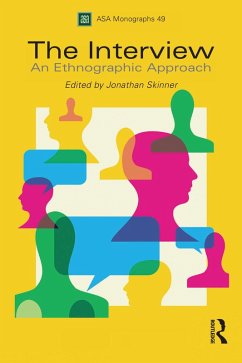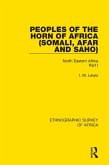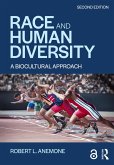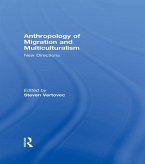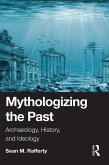The Interview (eBook, PDF)
An Ethnographic Approach
Redaktion: Skinner, Jonathan
37,95 €
37,95 €
inkl. MwSt.
Sofort per Download lieferbar

19 °P sammeln
37,95 €
Als Download kaufen

37,95 €
inkl. MwSt.
Sofort per Download lieferbar

19 °P sammeln
Jetzt verschenken
Alle Infos zum eBook verschenken
37,95 €
inkl. MwSt.
Sofort per Download lieferbar
Alle Infos zum eBook verschenken

19 °P sammeln
The Interview (eBook, PDF)
An Ethnographic Approach
Redaktion: Skinner, Jonathan
- Format: PDF
- Merkliste
- Auf die Merkliste
- Bewerten Bewerten
- Teilen
- Produkt teilen
- Produkterinnerung
- Produkterinnerung

Bitte loggen Sie sich zunächst in Ihr Kundenkonto ein oder registrieren Sie sich bei
bücher.de, um das eBook-Abo tolino select nutzen zu können.
Hier können Sie sich einloggen
Hier können Sie sich einloggen
Sie sind bereits eingeloggt. Klicken Sie auf 2. tolino select Abo, um fortzufahren.

Bitte loggen Sie sich zunächst in Ihr Kundenkonto ein oder registrieren Sie sich bei bücher.de, um das eBook-Abo tolino select nutzen zu können.
What are new interview methods and practices in our new 'interview society' and how do they relate to traditional social science research? This volume interrogates the interview as understood, used - and under-used - by anthropologists.
- Geräte: PC
- ohne Kopierschutz
- eBook Hilfe
Andere Kunden interessierten sich auch für
![A Natural History of the Brown Mouse Lemur (eBook, PDF) A Natural History of the Brown Mouse Lemur (eBook, PDF)]() Sylvia AtsalisA Natural History of the Brown Mouse Lemur (eBook, PDF)42,95 €
Sylvia AtsalisA Natural History of the Brown Mouse Lemur (eBook, PDF)42,95 €![Peoples of the Horn of Africa (Somali, Afar and Saho) (eBook, PDF) Peoples of the Horn of Africa (Somali, Afar and Saho) (eBook, PDF)]() I. M. LewisPeoples of the Horn of Africa (Somali, Afar and Saho) (eBook, PDF)40,95 €
I. M. LewisPeoples of the Horn of Africa (Somali, Afar and Saho) (eBook, PDF)40,95 €![Race and Human Diversity (eBook, PDF) Race and Human Diversity (eBook, PDF)]() Robert L. AnemoneRace and Human Diversity (eBook, PDF)57,95 €
Robert L. AnemoneRace and Human Diversity (eBook, PDF)57,95 €![Anthropology of Migration and Multiculturalism (eBook, PDF) Anthropology of Migration and Multiculturalism (eBook, PDF)]() Anthropology of Migration and Multiculturalism (eBook, PDF)46,95 €
Anthropology of Migration and Multiculturalism (eBook, PDF)46,95 €![Mythologizing the Past (eBook, PDF) Mythologizing the Past (eBook, PDF)]() Sean RaffertyMythologizing the Past (eBook, PDF)39,95 €
Sean RaffertyMythologizing the Past (eBook, PDF)39,95 €![Exploring Political Ecology (eBook, PDF) Exploring Political Ecology (eBook, PDF)]() Alexander M. ErvinExploring Political Ecology (eBook, PDF)39,95 €
Alexander M. ErvinExploring Political Ecology (eBook, PDF)39,95 €![Family Sacrifices (eBook, PDF) Family Sacrifices (eBook, PDF)]() Russell M. JeungFamily Sacrifices (eBook, PDF)16,95 €
Russell M. JeungFamily Sacrifices (eBook, PDF)16,95 €-
-
-
What are new interview methods and practices in our new 'interview society' and how do they relate to traditional social science research? This volume interrogates the interview as understood, used - and under-used - by anthropologists.
Dieser Download kann aus rechtlichen Gründen nur mit Rechnungsadresse in A, B, BG, CY, CZ, D, DK, EW, E, FIN, F, GR, HR, H, IRL, I, LT, L, LR, M, NL, PL, P, R, S, SLO, SK ausgeliefert werden.
Produktdetails
- Produktdetails
- Verlag: Taylor & Francis
- Seitenzahl: 288
- Erscheinungstermin: 3. Juni 2020
- Englisch
- ISBN-13: 9781000184792
- Artikelnr.: 59574759
- Verlag: Taylor & Francis
- Seitenzahl: 288
- Erscheinungstermin: 3. Juni 2020
- Englisch
- ISBN-13: 9781000184792
- Artikelnr.: 59574759
- Herstellerkennzeichnung Die Herstellerinformationen sind derzeit nicht verfügbar.
Jonathan Skinner is Senior Lecturer in Social Anthropology at Queen's University Belfast, UK.
AcknowledgementsAbout the Editor and ContributorsIntroduction A Fourt-part
Introduction to the Interview: Introducing the Interview; Society,
Sociology and the Interview; Anthropology and the Interview; Anthropology
and the Interview - Edited. Jonathan Skinner (Queen's University Belfast,
UK) Part One: Positioning The InterviewThe Interview as a Form of
Talking-partnership: Dialectical, Focused, Ambiguous, Special. Nigel
Rapport (St Andrews University, UK) Ethnography is Not Participant
Observation: Reflections on the Interview as Participatory Qualitative
Research. Jenny Hockey (University of Sheffield, UK) and Martin Forsey
(University of Western Australia, Australia) Finding and Mining the Talk:
Negotiating Knowledge and Knowledge Transfer in the Field. Lisette
Josephides (Queen's University Belfast, UK)Part Two: Interview
TechniquesThe Autobiographical Narrative Interview: A Potential Arena of
Emotional Remembering, Performance and Reflection. Maruska Svasek and
Markieta Domecka (Queen's University Belfast, UK) Eliciting the Tacit:
Interviewing to Understand Bodily Experience. Georgiana Gore (Université
Blaise Pascal, France), Géraldine Rix-Lieévre (Université Blaise Pascal,
France), Olivier Wathelet (Institut Paul Bocuse, France) and Anne Cazemajou
(Université Blaise Pascal, France)Difficult Moments in the Ethnographic
Interview: Vulnerability, Silence and Rapport. Ann Montgomery (Barts and
The London School of Medicine and Dentistry, UK)Part Three: Interview Cases
Instances of Inspiration: Interviewing Dancers and Writers. Helena Wulff
(Stockholm University, Sweden)'Angola Calling': A Study of Registers of
Imagination in the Interview. Madalina Florescu (School of Oriental and
African Studies, UK)The Contortions of Forgiveness: Betrayal, Abandonment,
and Narrative Entrapment among the Harkis. Vincent Crapanzano (CUNY,
USA)Integrating Interviews into Quantitive Domains: Reaching the Parts
Controlled Trials Can't Reach. Alex Greene (University of Dundee,
UK)Recalling What Was Unspeakable: Hunger in North Korea. Sandra Fahy
(L'École des Hautes Études en Sciences Sociales, France)Re-presenting
Hopis: Indigenous Responses to the Ethnographic Interview. Nick McCaffery
(Independent Scholar, UK)Epilogue: Expectations, Auto-Narrative and Beyond.
Marilyn Strathern (University of Cambridge, UK)ReferencesIndex
Introduction to the Interview: Introducing the Interview; Society,
Sociology and the Interview; Anthropology and the Interview; Anthropology
and the Interview - Edited. Jonathan Skinner (Queen's University Belfast,
UK) Part One: Positioning The InterviewThe Interview as a Form of
Talking-partnership: Dialectical, Focused, Ambiguous, Special. Nigel
Rapport (St Andrews University, UK) Ethnography is Not Participant
Observation: Reflections on the Interview as Participatory Qualitative
Research. Jenny Hockey (University of Sheffield, UK) and Martin Forsey
(University of Western Australia, Australia) Finding and Mining the Talk:
Negotiating Knowledge and Knowledge Transfer in the Field. Lisette
Josephides (Queen's University Belfast, UK)Part Two: Interview
TechniquesThe Autobiographical Narrative Interview: A Potential Arena of
Emotional Remembering, Performance and Reflection. Maruska Svasek and
Markieta Domecka (Queen's University Belfast, UK) Eliciting the Tacit:
Interviewing to Understand Bodily Experience. Georgiana Gore (Université
Blaise Pascal, France), Géraldine Rix-Lieévre (Université Blaise Pascal,
France), Olivier Wathelet (Institut Paul Bocuse, France) and Anne Cazemajou
(Université Blaise Pascal, France)Difficult Moments in the Ethnographic
Interview: Vulnerability, Silence and Rapport. Ann Montgomery (Barts and
The London School of Medicine and Dentistry, UK)Part Three: Interview Cases
Instances of Inspiration: Interviewing Dancers and Writers. Helena Wulff
(Stockholm University, Sweden)'Angola Calling': A Study of Registers of
Imagination in the Interview. Madalina Florescu (School of Oriental and
African Studies, UK)The Contortions of Forgiveness: Betrayal, Abandonment,
and Narrative Entrapment among the Harkis. Vincent Crapanzano (CUNY,
USA)Integrating Interviews into Quantitive Domains: Reaching the Parts
Controlled Trials Can't Reach. Alex Greene (University of Dundee,
UK)Recalling What Was Unspeakable: Hunger in North Korea. Sandra Fahy
(L'École des Hautes Études en Sciences Sociales, France)Re-presenting
Hopis: Indigenous Responses to the Ethnographic Interview. Nick McCaffery
(Independent Scholar, UK)Epilogue: Expectations, Auto-Narrative and Beyond.
Marilyn Strathern (University of Cambridge, UK)ReferencesIndex
AcknowledgementsAbout the Editor and ContributorsIntroduction A Fourt-part
Introduction to the Interview: Introducing the Interview; Society,
Sociology and the Interview; Anthropology and the Interview; Anthropology
and the Interview - Edited. Jonathan Skinner (Queen's University Belfast,
UK) Part One: Positioning The InterviewThe Interview as a Form of
Talking-partnership: Dialectical, Focused, Ambiguous, Special. Nigel
Rapport (St Andrews University, UK) Ethnography is Not Participant
Observation: Reflections on the Interview as Participatory Qualitative
Research. Jenny Hockey (University of Sheffield, UK) and Martin Forsey
(University of Western Australia, Australia) Finding and Mining the Talk:
Negotiating Knowledge and Knowledge Transfer in the Field. Lisette
Josephides (Queen's University Belfast, UK)Part Two: Interview
TechniquesThe Autobiographical Narrative Interview: A Potential Arena of
Emotional Remembering, Performance and Reflection. Maruska Svasek and
Markieta Domecka (Queen's University Belfast, UK) Eliciting the Tacit:
Interviewing to Understand Bodily Experience. Georgiana Gore (Université
Blaise Pascal, France), Géraldine Rix-Lieévre (Université Blaise Pascal,
France), Olivier Wathelet (Institut Paul Bocuse, France) and Anne Cazemajou
(Université Blaise Pascal, France)Difficult Moments in the Ethnographic
Interview: Vulnerability, Silence and Rapport. Ann Montgomery (Barts and
The London School of Medicine and Dentistry, UK)Part Three: Interview Cases
Instances of Inspiration: Interviewing Dancers and Writers. Helena Wulff
(Stockholm University, Sweden)'Angola Calling': A Study of Registers of
Imagination in the Interview. Madalina Florescu (School of Oriental and
African Studies, UK)The Contortions of Forgiveness: Betrayal, Abandonment,
and Narrative Entrapment among the Harkis. Vincent Crapanzano (CUNY,
USA)Integrating Interviews into Quantitive Domains: Reaching the Parts
Controlled Trials Can't Reach. Alex Greene (University of Dundee,
UK)Recalling What Was Unspeakable: Hunger in North Korea. Sandra Fahy
(L'École des Hautes Études en Sciences Sociales, France)Re-presenting
Hopis: Indigenous Responses to the Ethnographic Interview. Nick McCaffery
(Independent Scholar, UK)Epilogue: Expectations, Auto-Narrative and Beyond.
Marilyn Strathern (University of Cambridge, UK)ReferencesIndex
Introduction to the Interview: Introducing the Interview; Society,
Sociology and the Interview; Anthropology and the Interview; Anthropology
and the Interview - Edited. Jonathan Skinner (Queen's University Belfast,
UK) Part One: Positioning The InterviewThe Interview as a Form of
Talking-partnership: Dialectical, Focused, Ambiguous, Special. Nigel
Rapport (St Andrews University, UK) Ethnography is Not Participant
Observation: Reflections on the Interview as Participatory Qualitative
Research. Jenny Hockey (University of Sheffield, UK) and Martin Forsey
(University of Western Australia, Australia) Finding and Mining the Talk:
Negotiating Knowledge and Knowledge Transfer in the Field. Lisette
Josephides (Queen's University Belfast, UK)Part Two: Interview
TechniquesThe Autobiographical Narrative Interview: A Potential Arena of
Emotional Remembering, Performance and Reflection. Maruska Svasek and
Markieta Domecka (Queen's University Belfast, UK) Eliciting the Tacit:
Interviewing to Understand Bodily Experience. Georgiana Gore (Université
Blaise Pascal, France), Géraldine Rix-Lieévre (Université Blaise Pascal,
France), Olivier Wathelet (Institut Paul Bocuse, France) and Anne Cazemajou
(Université Blaise Pascal, France)Difficult Moments in the Ethnographic
Interview: Vulnerability, Silence and Rapport. Ann Montgomery (Barts and
The London School of Medicine and Dentistry, UK)Part Three: Interview Cases
Instances of Inspiration: Interviewing Dancers and Writers. Helena Wulff
(Stockholm University, Sweden)'Angola Calling': A Study of Registers of
Imagination in the Interview. Madalina Florescu (School of Oriental and
African Studies, UK)The Contortions of Forgiveness: Betrayal, Abandonment,
and Narrative Entrapment among the Harkis. Vincent Crapanzano (CUNY,
USA)Integrating Interviews into Quantitive Domains: Reaching the Parts
Controlled Trials Can't Reach. Alex Greene (University of Dundee,
UK)Recalling What Was Unspeakable: Hunger in North Korea. Sandra Fahy
(L'École des Hautes Études en Sciences Sociales, France)Re-presenting
Hopis: Indigenous Responses to the Ethnographic Interview. Nick McCaffery
(Independent Scholar, UK)Epilogue: Expectations, Auto-Narrative and Beyond.
Marilyn Strathern (University of Cambridge, UK)ReferencesIndex
